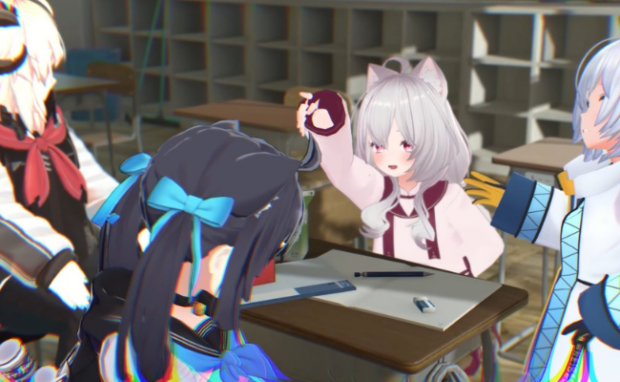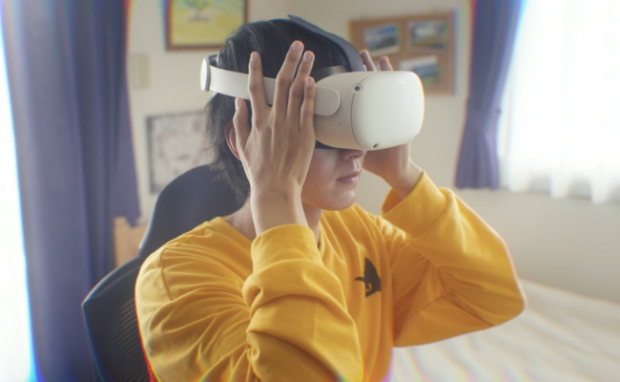Earn your real-life diploma with VR high school
Imagine slipping on a VR headset and stepping into a bustling high school campus, not in the physical world, but in an immersive digital universe. This isn’t a scene from a futuristic novel. It’s the reality Japanese tech company Aominext is bringing to life with their groundbreaking metaverse project.
Aominext launched a metaverse project that lets students graduate high school without leaving their room. They will attend classes by donning VR headsets to control avatars in a virtual reality campus. Here, they interact with peers, attend classes, and earn an accredited high school diploma.
How will this VR high school work?

On January 9, Aominext announced it would launch a metaverse correspondence school system in collaboration with Yuushi International High School. That means that it will provide a real education in a virtual environment.
The school’s official website says it will enable students to “be yourself without being constrained by your appearance. You could devote yourself to studying without worrying about your gender and insecurities.
The school’s official website says it will enable students to “be yourself without being constrained by your appearance. You could devote yourself to studying without worrying about your gender and insecurities.”
Instead, you’ll attend a virtual campus called Yuushi International High School as an anime character. It looks like a regular high school with a building and classrooms.
You may also like: Scientists create VR goggles for mice
It will hold a three-year, credit-based course with a curriculum recognized by the Japanese Ministry of Education, Culture, Sports, Science, and Technology. Also, Yuushi Kokusai High School is “a high school stipulated in Article 1 of the Basic Act on School Education,” says its website.
The VR campus will also stimulate interaction by holding online homeroom, e-sports tournaments, and virtual school festivals.
How will digital learning replace the traditional?

Many experts have predicted digital education will replace conventional methods in the near future. For example, GoStudent co-founder and CEO Felix Ohswald studied UK education’s future and found that technological innovations change how we consume information.
“What we learn will also change,” Ohswald said. “To actively continue to shape the future of how students learn, we must embrace what lies ahead. We’re excited to see how education will evolve and what this means for us as we continue on our mission to reimagine education.”
He shows that potential future in “The End of School as You Know It: Education in 2050” white paper. It begins with future education’s technological timeline:
- 2020s: Education will embrace artificial intelligence, drastically changing teaching methods. Coincidentally, I reported two days ago that more schools are using ChatGPT.
- 2030s: AI will take over tasks humans don’t want.
- 2040s: Virtual reality will create fully immersive experiences for education.
- 2050s: Brain implants will deliver knowledge by “merely downloading it directly to one’s brain.”
Japan’s VR high school surprisingly shows we are progressing faster than his predictions. Also, GoStudent explained how Education Technology (EdTech) platforms change the main objective of education.
“Learning will no longer be driven purely by the skills that employers want and the subjects that governments or policy-makers value,” its research said.
You may also like: More schools promote learning with ChatGPT
Modern education enables citizens to contribute to a nation’s economy by serving a role. Governments and companies will still demand educated workers, but students will have more freedom in their purpose.
The paper cites Taiwan, a country that allows students to explore their interests, become lifelong learners, and pursue their goals. That new system is the “108 Curriculum.”
Teachers will remain, but they will use artificial intelligence. AI will help them guide their students’ learning pace and subject choice.
Journey into the unknown
This VR high school is more than just an educational institution. It’s a testament to the endless possibilities that technology brings to the table.
This unusual mix of virtual reality and education might compel students to learn. On the other hand, we should be careful about its potential unintended effects
As we venture further into this digital age, projects like Aominext’s VR high school offer a tantalizing preview of what’s possible when we harness technology to enrich and expand our educational experiences.
It’s a journey into the unknown, filled with potential and promise, signaling a new chapter in the story of how we learn.